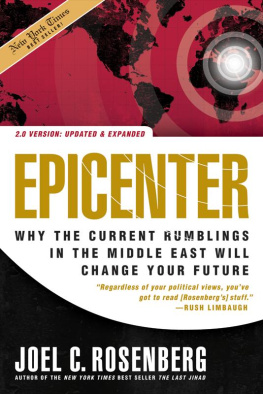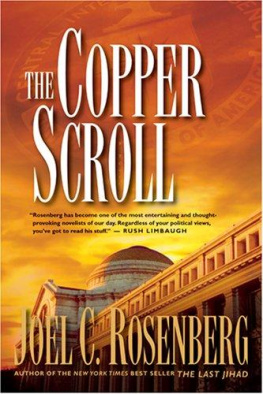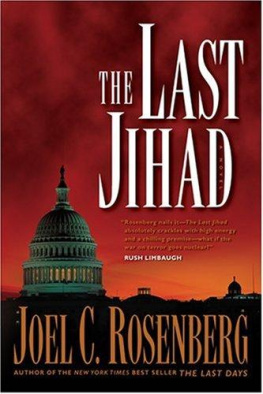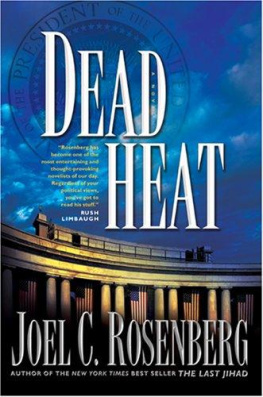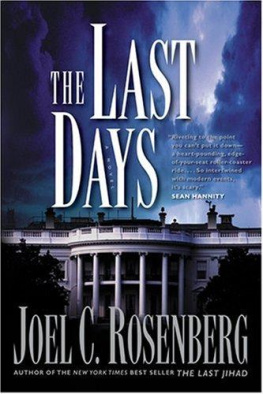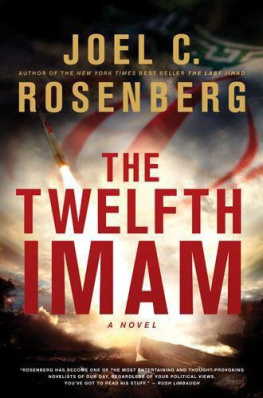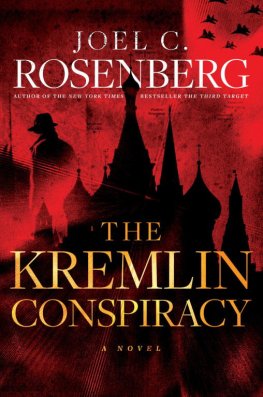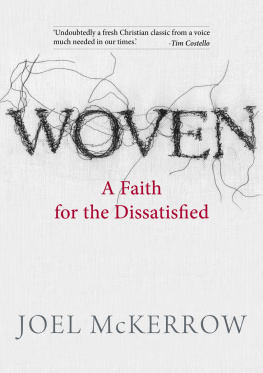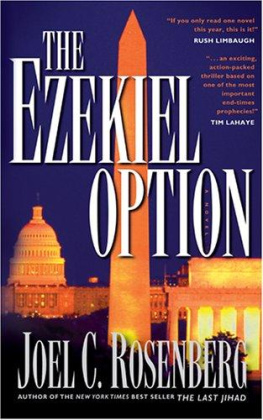

>> THERE IS A CHINESE CURSE WHICH SAYS, MAY HE LIVE IN INTERESTING TIMES. LIKE IT OR NOT, WE LIVE IN INTERESTING TIMES. THEY ARE TIMES OF DANGER AND UNCERTAINTY.
>> SENATOR ROBERT F. KENNEDY
>> JUNE 6, 1966
Visit Tyndales exciting Web site at www.tyndale.com
TYNDALE and Tyndales quill logo are registered trademarks of Tyndale House Publishers, Inc.
Epicenter: Why the Current Rumblings in the Middle East Will Change Your Future
Copyright 2006, 2008 by Joel C. Rosenberg. All rights reserved.
Cover artwork copyright by Photodisc. All rights reserved.
Interior map images copyright by Digital Wisdom. All rights reserved.
Author photo copyright 2005 by Joel C. Rosenberg. All rights reserved.
Designed by Dean H. Renninger
Unless otherwise indicated, all Scripture quotations are taken from the Holy Bible, New Living Translation, copyright 1996, 2004. Used by permission of Tyndale House Publishers, Inc., Carol Stream, Illinois 60188. All rights reserved.
Scripture quotations marked NASB are taken from the New American Standard Bible, 1960, 1962, 1963, 1968, 1971, 1972, 1973, 1975, 1977 by The Lockman Foundation. Used by permission.
Scripture quotations marked NIV are taken from the Holy Bible, New International Version. NIV. Copyright 1973, 1978, 1984 by International Bible Society. Used by permission of Zondervan. All rights reserved.
Scripture quotations marked KJV are taken from the Holy Bible, King James Version.
Library of Congress Cataloging-in-Publication Data
Rosenberg, Joel C., date.
Epicenter : why the current rumblings in the Middle East will change your future / Joel C. Rosenberg.
p. cm.
Includes bibliographical references and index.
ISBN-13: 978-1-4143-1135-7 (hc : alk. paper)
ISBN-10: 1-4143-1135-4 (hc : alk. paper)
ISBN-13: 978-1-4143-1136-4 (sc : alk. paper)
ISBN-10: 1-4143-1136-2 (sc : alk. paper)
1. BiblePropheciesMiddle East. 2. BiblePropheciesEnd of the world. 3. End of the World. 4. Eschatology. 5. Eschatology, Islamic. I. Title.
BS649.N49R67 2006
220.15dc22 2006019939
Build: 2012-11-14 14:54:13
To our dear friends Dr. T. E. Koshy and Dr. Indira Koshy, thank you so much for your love, your friendship, and your example. CONTENTS EPICENTER 2.0: INTRODUCTION TO THE NEW EDITION
The attack came hard, fast, and without warning.
At 8:07 a.m. on July 12, 2006, in broad daylight, forces of the Iranian- and Syrian-backed terrorist organization known as Hezbollah (the party of God) launched a brazen, unprovoked raid against an Israeli patrol on the Israeli side of the border with Lebanon. Within minutes, Islamic guerrillas had killed three Jewish soldiers and captured two more: First Sergeant Eldad Regev, twenty-seven, and Master Sergeant Ehud Udi Goldwasser, thirty-one, who had just gotten married ten months earlier.
The attack caught 7 million Israelis just starting the new day completely off guard. Whats more, it came on the heels of an unprovoked Hamas terror raid on the Israeli side of Israels southern border with the Gaza Strip just weeks before.
At precisely 5:40 a.m. local time on June 25, eight armed Palestinians infiltrated Israel through a tunnel leading from the Strip into Israels territory, and split into three teams once they came out, reported Yediot Aharonot , a leading Israeli daily newspaper. One team approached an armored personnel carrier stationed at the place and fired at it. The APC was empty and no injuries were reported in that attack. Another group simultaneously fired a missile and hurled grenades at a tank standing nearby. The missile hit the tanks rear, hurting the four soldiers that were inside. Two were immediately killed, a third soldier sustained injuries and the fourth was initially reported missing. As the incident developed, security officials came to believe that the soldier has been kidnapped. During the attack, a third terrorist team moved in the direction of a desert patrol army post and engaged in a shooting battle with the soldiers.
The abducted Israeli soldier, Corporal Gilad Schalit, was only nineteen.
Israeli prime minister Ehud Olmert was suddenly faced with a two-front war. He quickly and defiantly rejected negotiations with the radical jihadist groups to get back Schalit, Goldwasser, and Regev. Instead, he ordered the Israeli Defense Forces (IDF) to launch massive military operations on both fronts aimed at recovering Israels men and crippling the Hezbollah and Hamas organizations. Israeli fighter jets bombed runways at Beirut International Airport. Israeli tanks and troops stormed into Gaza and southern Lebanon. But just as the initial attacks by the terror groups had caught Israel and the world by surprise, so, too, did their response.
Rather than finding quick and easy success, the most powerful military in the history of the Middle East found itself strangely outfoxed and outmaneuvered. Over the course of thirty-three days, Hezbollah launched more than four thousand missiles at civilian Israeli targets as far south as Tiberias on the Sea of Galilee, terrifying the Jewish population and causing tens of millions of dollars worth of property damage. More than one million Israelis living along the northern border with Lebanon were forced to flee their homes or live underground in bomb shelters. Meanwhile, the half-million Israelis living near the southern border with Gaza found themselves subjected to thousands more missiles, rockets, and mortars. Many of the weapons fired by the jihadists were launched from inside private homes, local schools and hospitals, and even mosques, making it extremely difficult for the Israeli air force to retaliate without risking enormous civilian casualties and collateral damage.
I had completed the manuscript for the original hardcover edition of Epicenter just a month earlier, making the case that Israel was destined to become the center of global events and interest in the last days of human history. Now a new and devastating geopolitical earthquake was traumatizing the people of the Middle East. Once again, the eyes of the world were riveted on Israel and her neighbors, the epicenter of the momentous events shaking our world and shaping our future. What would the future hold?
The war dominated headlines for weeks. Newspapers, magazines, Web sites, and cable news networks provided almost nonstop coverage of the conflict, even asking whether the war had prophetic implications. In a USA Today article entitled In the Headlines, Glimpses of the Apocalypse, columnist Chuck Raasch raised a question on the minds of many around the world: Are these the end of times?... You cant look at the headlines these days and not conjure up apocalyptic visions.... With the war in Iraq persisting, with fresh fighting in Afghanistan, with missiles raining down on even Nazareth, the hometown of Jesus Christ, the worlds most powerful governments and the United Nations appear unable or unwilling to stop a chain of events that may be spinning out of earthly control.
Raasch was not alone in his analysis. CNN, FOX, and MSNBC devoted numerous segments of their Middle East coverage to asking whether current events suggest we are living in the last days before the return of Christ, as did other networks. A headline in the Waco Tribune-Herald at the time asked, Are We Living in the Final Days? A Columbus Dispatch headline asked, Is the Mideast Rupture a Sign of the Rapture? Salon.com declared, The Apocalypse Is Drawing Closer! Newt Gingrich, the former Speaker of the House, merely added fuel to the fire when he said he believes we are living in the early stages of World War III.
Next page
